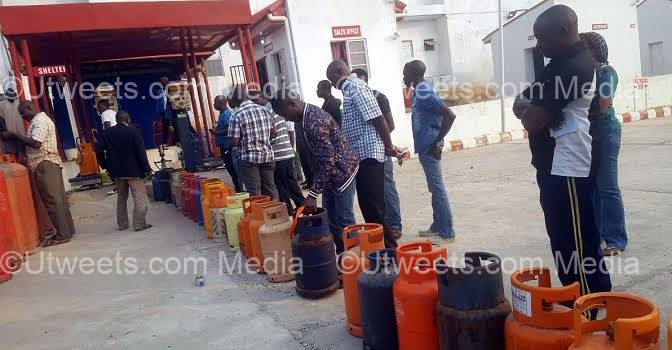SECURE YOUR BANK ACCOUNT NOW| SEE THE LATEST METHOD SCAMMERS/FRAUDSTERS ARE USING TO WITHDRAW MONEY FROM ACCOUNT WITHOUT HAVING ACCESS TO YOUR BANK/CARD DETAILS.Cooking Gas Prices in Nigeria: Key Factors Driving Fluctuations This Week. This week, Nigerians have observed varying prices for cooking gas across different regions, with costs ranging between ₦1,300 and ₦1,400 per kilogram. ...READ THE FULL STORY FROM SOURCE ...READ THE FULL STORY FROM SOURCE
These price differences are largely influenced by a combination of global and local factors, including international LPG (Liquefied Petroleum Gas) prices, foreign exchange fluctuations, and the seasonal surge in demand as the festive period approaches.
While efforts to increase domestic LPG production and streamline the import process may help stabilize prices in the long term, consumers should brace for short-term fluctuations, which are influenced by the dynamics of the global oil market, exchange rates, and domestic economic conditions.
Key Factors Influencing Cooking Gas Prices.
Global Crude Oil Prices
The price of cooking gas is closely tied to global crude oil prices. Nigeria, despite being a major oil producer, relies heavily on imported LPG. Any increase in global oil prices directly raises the cost of LPG imports. As a result, fluctuations in international oil markets have a direct impact on the retail price of cooking gas in Nigeria.
Foreign Exchange Rates
The exchange rate between the Nigerian Naira and the US Dollar plays a crucial role in determining the cost of cooking gas. Since LPG imports are typically paid for in US Dollars, a weakening Naira increases the cost of imports, leading to higher retail prices for consumers. The exchange rate remains a significant factor in the pricing structure of cooking gas.
Domestic LPG Supply and Importation
While Nigeria does produce some of its own LPG, the country often faces supply shortages that necessitate the importation of additional gas to meet local demand. In periods of strong domestic production, prices may stabilize. However, when imports are required to fill the gap, price increases can occur, especially if there are disruptions in supply chains or challenges in securing foreign exchange for imports.SECURE YOUR BANK ACCOUNT NOW| SEE THE LATEST METHOD SCAMMERS/FRAUDSTERS ARE USING TO WITHDRAW MONEY FROM ACCOUNT WITHOUT HAVING ACCESS TO YOUR BANK/CARD DETAILS.
Transportation and Logistics Costs
The cost of transporting LPG from production sites or import terminals to distribution points and retail outlets is another key determinant of gas prices. With rising transportation costs, especially due to fuel price increases, the final retail price of LPG can experience upward pressure. This is particularly relevant in regions where transportation infrastructure is less developed.
Seasonal Demand
The festive season, particularly around Christmas and New Year, typically sees a spike in cooking gas demand as households increase their usage in preparation for holiday celebrations. This seasonal surge in demand can lead to temporary price hikes as retailers adjust prices to reflect the heightened consumption. The increased demand often leads to shortages in certain regions, further driving up prices.
Inflation and Economic Policies
Inflation is another major contributor to rising cooking gas prices. As the general cost of goods and services increases, the price of LPG tends to follow suit. Additionally, government economic policies, such as the imposition of import duties, taxes, or subsidies on LPG, can directly influence prices. Any changes in fiscal or monetary policy can impact both the cost of importing and the local pricing structure.
Supply Chain Efficiency
The efficiency of the LPG supply chain also plays a crucial role in pricing. Delays or inefficiencies at import terminals, storage facilities, or distribution networks can cause temporary shortages and result in higher prices. When supply chains are disrupted, whether due to logistical challenges, strikes, or administrative bottlenecks, retail prices often rise as a result of these delays.
Market Competition
The level of competition among LPG marketers and distributors can also affect prices. In areas where there are few suppliers, prices tend to be higher due to limited market competition. Conversely, regions with multiple distributors often see more competitive pricing, which can help keep prices lower.
Government Regulations
Policies related to LPG, such as subsidies, import tariffs, or regulations designed to encourage domestic production, directly impact its price. Recent efforts by the Nigerian government to boost domestic LPG production and reduce reliance on imports may have long-term benefits for price stabilization, although such measures take time to implement and yield results.
Storage and Handling Costs
The cost of storing and handling LPG by retailers is another contributing factor to its price. Retailers incur various operational costs, including the storage of gas in cylinders, which are factored into the final retail price. Increases in these operational costs, particularly due to rising energy prices or inflationary pressures on other goods and services, often lead to higher prices for consumers.
Current Cooking Gas Prices in Nigeria
The following are the current average prices for cooking gas in Nigeria this week:
1kg Cooking Gas – ₦1,300
3kg Cooking Gas – ₦3,900
5kg Cooking Gas – ₦6,500
6kg Cooking Gas – ₦7,800
10kg Cooking Gas – ₦13,000
12.5kg Cooking Gas – ₦16,250
These prices are subject to change based on the aforementioned factors, and consumers in different regions may experience variations depending on local supply and demand dynamics.SECURE YOUR BANK ACCOUNT NOW| SEE THE LATEST METHOD SCAMMERS/FRAUDSTERS ARE USING TO WITHDRAW MONEY FROM ACCOUNT WITHOUT HAVING ACCESS TO YOUR BANK/CARD DETAILS.
Looking Ahead
As the festive season progresses and with ongoing economic uncertainties, Nigerians should expect further fluctuations in the price of cooking gas. While there are long-term strategies to stabilize prices, such as increased domestic production and improved supply chain management, the short-term outlook remains subject to external factors like global oil prices, exchange rates, and seasonal demand spikes. Consumers are advised to plan accordingly, particularly in preparation for the holidays when gas usage tends to be at its highest.…Read -T.he.Full_Article.Here.



